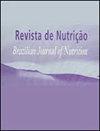Processed and ultra-processed foods consumption in adults and its relationship with quality of life and quality of sleep
IF 0.5
4区 医学
Q4 NUTRITION & DIETETICS
Revista De Nutricao-brazilian Journal of Nutrition
Pub Date : 2022-01-01
DOI:10.1590/1678-9865202235e220173
引用次数: 2
Abstract
ABSTRACT Objective: To evaluate the consumption of processed and ultra-processed foods in Paraguayan adults and its relationship with quality of life and sleep quality. Methods: A cross-sectional descriptive observational study was carried out on Paraguayan adults in May 2022. An online survey was applied in which sociodemographic data, frequency of food consumption using the NOVA classification and Pan American Health Organization criteria, quality of life evaluated by the European Quality of Life-5 Dimensions and report of hours of sleep were collected. Results: A total of 273 Paraguayan adults were included in the study, of which 71.1% were female, 51.6% lived in the capital, 53.1% were single, 66% had a university educational level and the average age was 36.48±13.2. Regarding the consumption of processed and ultra-processed foods, the critical nutrients most consumed daily were free sugars by 34.0%, and fats by 23.4% of the population. The global quality of life index was low (0,58±0,05) and 69.0% reported insufficient hours of sleep. Statistically significant relationships were found between the consumption of processed and ultra-processed foods with quality of life and quality of sleep (p<0.05 for both). Conclusion: The most consumed critical nutrients in the Paraguayan adult population are free sugars and fats, finding a significant relationship between the consumption of processed and ultra-processed foods with quality of life and quality of sleep.成人加工和超加工食品的消费及其与生活质量和睡眠质量的关系
摘要目的:评价巴拉圭成人加工食品和超加工食品的消费情况及其与生活质量和睡眠质量的关系。方法:于2022年5月对巴拉圭成年人进行横断面描述性观察研究。采用了一项在线调查,收集了社会人口统计数据、使用NOVA分类和泛美卫生组织标准的食物消费频率、根据欧洲生活质量5维度评估的生活质量和睡眠时间报告。结果:共纳入273名巴拉圭成年人,其中71.1%为女性,51.6%居住在首都,53.1%为单身,66%为大学学历,平均年龄36.48±13.2岁。在加工和超加工食品的消费方面,每日消耗最多的关键营养素是游离糖(占34.0%)和脂肪(占23.4%)。总体生活质量指数较低(0.58±0.05),69.0%报告睡眠时间不足。加工食品和超加工食品的消费与生活质量和睡眠质量之间存在统计学意义的关系(p<0.05)。结论:巴拉圭成年人口中消耗最多的关键营养素是游离糖和脂肪,发现加工和超加工食品的消费与生活质量和睡眠质量之间存在显著关系。
本文章由计算机程序翻译,如有差异,请以英文原文为准。
求助全文
约1分钟内获得全文
求助全文
来源期刊
CiteScore
1.20
自引率
12.50%
发文量
24
审稿时长
6-12 weeks
期刊介绍:
Revista de Nutrição is former Revista de Nutrição da Puccamp, founded in 1988. It is a bimonthly publication every four months and it is of responsibility of the Centro de Ciências da Vida, da Pontifícia Universidade Católica de Campinas . It publishes articles that contribute to the study of Nutrition in its many sub-areas and interfaces; and is open to contributions of the national and international scientific communities.

 求助内容:
求助内容: 应助结果提醒方式:
应助结果提醒方式:


